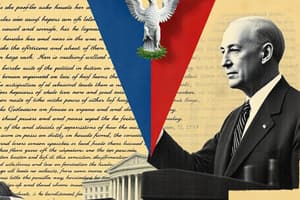Podcast
Questions and Answers
What are the principles of the Constitution?
What are the principles of the Constitution?
Separation of powers, checks and balances, the federal division of power.
What is separation of powers?
What is separation of powers?
A theory of government whereby political power is distributed among three branches: the legislature, the executive, and the judiciary.
How does the Constitution separate the powers?
How does the Constitution separate the powers?
It divides the national government into three branches: the legislature, the executive, and the judiciary.
What is limited government?
What is limited government?
What did the Founding Fathers hope to achieve by separating the powers?
What did the Founding Fathers hope to achieve by separating the powers?
Why did the Founding Fathers want to separate the powers?
Why did the Founding Fathers want to separate the powers?
What are checks and balances?
What are checks and balances?
The powers of the branches of government are completely separate.
The powers of the branches of government are completely separate.
How does the legislature check the executive?
How does the legislature check the executive?
How does the legislature check the judiciary?
How does the legislature check the judiciary?
How does the executive check the legislature?
How does the executive check the legislature?
How does the executive check the judiciary?
How does the executive check the judiciary?
How does the judiciary check the legislature?
How does the judiciary check the legislature?
How does the judiciary check the executive?
How does the judiciary check the executive?
What is decentralisation?
What is decentralisation?
What is the federal division of powers?
What is the federal division of powers?
What are states' rights?
What are states' rights?
How does the Constitution divide the federal powers?
How does the Constitution divide the federal powers?
How has the idea of federalism been able to change since the creation of the Constitution?
How has the idea of federalism been able to change since the creation of the Constitution?
Flashcards are hidden until you start studying
Study Notes
Principles of the Constitution
- Based on three key principles: separation of powers, checks and balances, and federal division of power.
- Separation of powers distributes authority among three branches: legislative, executive, and judiciary, functioning independently yet interdependently.
Separation of Powers
- Distributes political power across three branches of government.
- Legislative (Congress) makes laws, executive (headed by the president) enforces laws, and judiciary (Supreme Court) interprets laws.
Limited Government
- Asserts that the federal government should only operate within necessary limits for the common good of the populace.
Goals of the Founding Fathers
- Aimed for co-equal branches functioning independently.
- Sought to create checks and balances and promote limited government, reflecting the belief that "government is best which governs least."
Reasons for Separation
- To prevent tyranny by ensuring lawmaking, execution, and enforcement are carried out by separate bodies with distinct personnel.
- Notable resignations illustrated separation: Obama, Biden, and Clinton left the Senate to join the executive branch.
Checks and Balances
- A system where each governmental branch exercises control over the others to prevent abuses of power.
Shared Powers
- Despite the separation of institutions, powers are shared among branches, described more accurately as a theory of shared powers rather than complete separation.
Legislative Checks
- Checks the executive by amending or rejecting legislation, overriding vetoes, controlling budgets, confirming appointments, ratifying treaties, declaring war, investigating, and impeachment.
- Checks the judiciary through confirming appointments, initiating constitutional amendments, and impeaching judges.
Executive Checks
- Can recommend or veto legislation, and call special sessions of Congress.
- Checks the judiciary by appointing judges and granting pardons.
Judicial Checks
- Exercises judicial review, capable of declaring Congress's Acts or executive actions unconstitutional.
Decentralisation
- Government power is not solely centralized but distributed between federal and state governments.
Federal Division of Powers
- Underlies the Constitution, balancing centralized authority with state autonomy, informed by historical experiences.
- Supports national unity while allowing regional diversity, suitable for a large, diverse nation.
States' Rights
- Refers to powers and responsibilities of state governments, often used in opposition to expanding federal power.
Division of Federal Powers in the Constitution
- Implicit federalism: no direct mention in Constitution, but delineated through Articles laying out national powers and the Tenth Amendment reserving powers to states and the people.
- Unique powers reserved for the federal government include coining money, negotiating treaties, and maintaining military forces.
- Guarantees states’ rights like equal Senate representation and protections against unilateral changes.
Evolution of Federalism
- Constitution allowed flexibility for the concept of federalism to evolve, avoiding strict delineation between national and state powers, promoting adaptive governance over centuries.
Studying That Suits You
Use AI to generate personalized quizzes and flashcards to suit your learning preferences.




